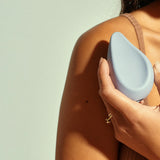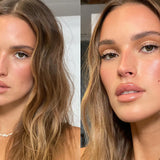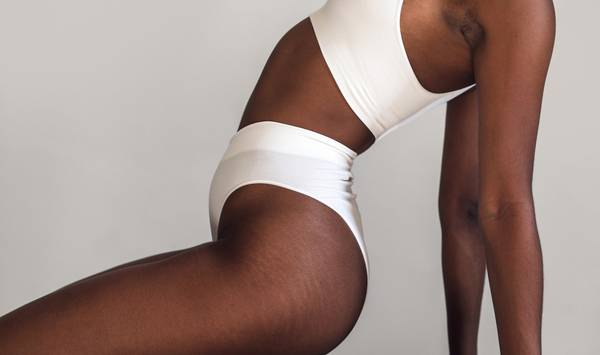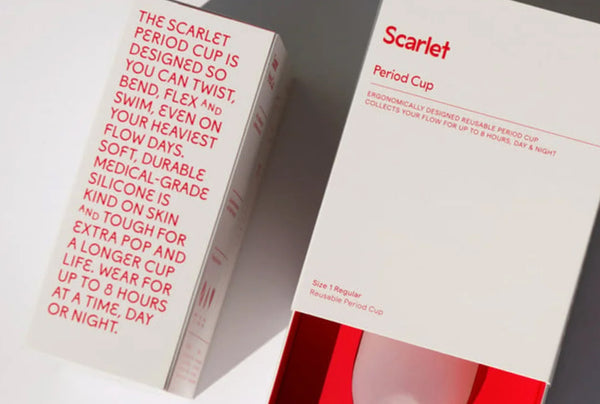Ah, the great debate: aluminium antiperspirants vs natural deodorants. What is the difference between an antiperspirant and a deodorant? Do natural deodorants work? And which natural deodorants are the best? We’ve got all your deodorant questions answered.
What is the difference between an antiperspirant and a deodorant?
There’s actually a big difference between the two. “Essentially, deodorants mask body odour whereas antiperspirants prevent body odour,” says Mukti, founder of Australian skincare brand Mukti Organics.
“Antiperspirants are primarily designed to stop you from sweating,” adds Lisa Raciti, founder of Australian organic and natural deodorant brand KIND-LY. “They do this by blocking the sweat glands with aluminium, and a number of other questionable ingredients, as well as synthetic fragrance to try and mask any odour.”
“A natural deodorant is instead made from only natural ingredients and is designed to stop odour, but will still allow your body to breathe and release toxins naturally,” explains Raciti. “This means that you may still sweat when wearing a natural deodorant. Remember though - sweat is your friend, it just doesn't have to stink.”
Why make the switch to a natural deodorant?
The decision to change from an aluminium antiperspirant to a deodorant isn’t just about choosing to make more natural choices in your beauty routine. “Traditional antiperspirants contain a number of ingredients that we should be concerned with applying to our skin, especially to such a sensitive area like the underarms,” says Raciti.
“The main culprits are aluminium, parabens, synthetic fragrances and a range of other chemical nasties. Aluminium is used to clog the sweat glands to prevent sweat, whilst also stopping the body’s ability to expel toxins. Your body becomes reliant on these chemical nasties, essentially forgetting how to naturally correct any bacterial imbalances on its own,” she adds.
“A lot has been written about the possible links between aluminium and breast cancer, which is why many people prefer to err on the side of caution and switch to an all-natural deodorant,” continues Raciti. “Parabens can mimic hormones in the body and have been associated with disrupting the functions of the endocrine system. Studies have also found this ‘synthetic estrogen’ in fat cells, including breast tissue, as the body does not easily break it down,” she warns.
“The difference between antiperspirants and deodorants is important as our bodies are designed to release sweat. It is not a process that is meant to be interfered with.”
Mukti, Mukti Organics founder
“While the jury is out on the long-term effects and health implications of antiperspirants, what we do know is that due to the number of hair follicles under the arms, the penetration of substances is increased, giving substances more direct access to our blood stream,” notes Mukti. “Unwanted substances like neurotoxins can accumulate within our bodies, so it is a good health practice to avoid and minimise unwanted exposure.”
“By switching to a natural deodorant, you are allowing your body to function in the way it was designed,” says Raciti. “Most people also find that once their body has fully adjusted to natural deodorant, that they actually sweat less as the body is better able to regulate itself,” she adds.
The trick to using a natural deodorant
If you’ve ever tried to make the switch to a natural deodorant but given up because it just didn’t seem to mask your body odour (or worse - it made you smell even more), you may have pulled the pin too quickly.
“Once you switch to a natural deodorant and stop using aluminium to clog all those underarm glands, some people may find they go through an initial ‘detox’ period where they sweat or smell more than usual,” explains Raciti, who adds that it’s not that your natural deodorant isn’t working, “it’s simply the body expelling all of those toxins and gunk that have been trapped in your armpits all this time”.
“This detox period can last anywhere from a couple of days to a couple of weeks, depending on the person. During this time, stick with using your natural deodorant – your body will eventually adjust and be healthier for it,” Raciti assures us.
What should you look for in a natural deodorant?
When natural deodorants first came onto the market, they didn’t exactly win a lot of fans. Originally only available in paste form, they were messy, didn’t necessarily smell great, and in some cases, they didn’t work very well either. But these days, especially here in Australia, there are plenty of impressive natural deodorants made locally that actually work.
“As with all products, you really should be studying the ingredient list,” says Mukti. “You want to look for a large inclusion of natural and plant-based ingredients that act as deodorisers and fight bacteria (which is what makes you smell).”
“In any natural deodorant it's good to look for ingredients such as sodium bicarbonate (bi-carb) or magnesium,” adds Thomas Richard, founder of Australian natural deodorant brand ASUVI. “Both these ingredients are great actives. However, if you have sensitive skin, go for the magnesium ones.”
“A natural deodorant shouldn’t contain any aluminium, parabens, alcohol, synthetic fragrance or nasties of any kind.”
Lisa Raciti, KIND-LY founder
“Magnesium (which is found in KIND-LY’s range of natural deodorants) neutralises any body odour while allowing you to perspire naturally and the probiotics contribute to the biodiversity and strength of your skin microbiome,” explains Raciti. "The good bacteria in probiotics essentially help keep the bad (smelly) bacteria at bay."
ASUVI’s deodorants are formulated to also alter the pH of your skin. “In this alkaline environment, the bacteria that causes odour can't live. This means that it prevents odour and soaks some of the sweat using absorbents but it doesn't stop the natural sweating process,” explains Richard.


5 natural deodorants to try:
Recommendations
Credentials
- Lucas Ottone / Stocksy
- Mukti / @muktiorganics
- Salt + Glow / @saltandglow
14 Nov 2020















